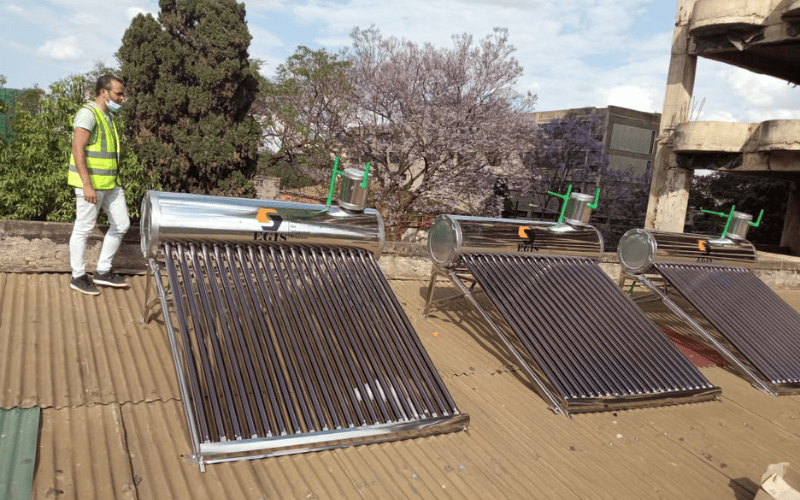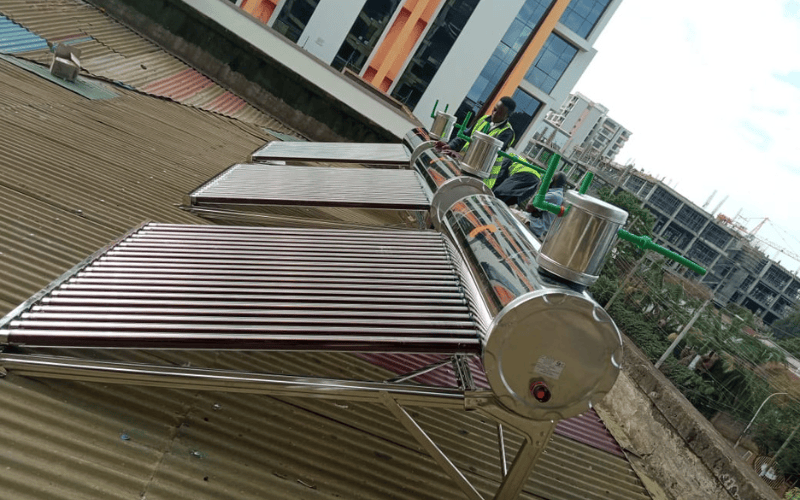

Description
Solar-powered borehole systems use solar energy to power pumps that extract groundwater from boreholes. These systems are particularly beneficial in remote or off-grid areas where access to conventional electricity is limited or unreliable. Here are some key reasons to use solar energy for boreholes:
1. Sustainable and Renewable Energy Source:
- Unlimited Resource: Solar energy is abundant and renewable, providing a reliable source of power for borehole pumps without the environmental impact associated with fossil fuels.
- Reduced Carbon Footprint: Solar-powered systems emit no greenhouse gases, contributing to a cleaner environment and helping to combat climate change.
2. Cost Savings:
- Lower Operating Costs: Once installed, solar-powered borehole systems have minimal operating costs since they use free solar energy. This reduces the need for expensive diesel or electricity.
- Government Incentives: Many regions offer financial incentives, rebates, or tax credits for installing solar energy systems, lowering the initial investment cost.
3. Reliability and Independence:
- Consistent Water Supply: Solar-powered systems provide a reliable water supply even in remote areas, independent of grid electricity. This is particularly crucial for agricultural and rural communities.
- Energy Independence: Reduces dependency on non-renewable energy sources and mitigates the impact of energy price fluctuations.
4. Low Maintenance:
- Durable Components: Solar borehole systems typically have fewer moving parts compared to conventional systems, resulting in lower maintenance requirements and costs.
- Long Lifespan: Quality solar panels and pumps are designed to last for many years, providing long-term, cost-effective solutions for water extraction.
5. Applications:
- Agriculture: Solar-powered boreholes can provide a reliable water supply for irrigation, improving crop yields and supporting sustainable farming practices.
- Domestic Use: In rural and off-grid areas, these systems can ensure a consistent supply of clean water for household needs, improving living conditions.
- Livestock: Reliable water sources are essential for livestock health and productivity; solar boreholes can provide a steady supply of water for animals.
- Community Water Supply: Solar-powered boreholes can supply water to entire communities, enhancing public health and supporting local development.
6. Environmental and Social Impact:
- Water Conservation: Solar-powered systems can be designed with efficient water use in mind, promoting sustainable water management practices.
- Community Development: Access to a reliable water source can support community growth, improve health outcomes, and foster economic development.
7. Technological Advancements:
- Enhanced Efficiency: Advances in solar technology have led to more efficient and reliable solar panels and pumps, even in less sunny conditions.
- Hybrid Systems: Solar-powered borehole systems can be integrated with other renewable energy sources or traditional power supplies to ensure continuous operation.
Conclusion: Solar-powered borehole systems are a sustainable and cost-effective solution for providing reliable water supply in various applications. By harnessing the power of the sun, these systems offer significant environmental benefits, reduce operating costs, and contribute to energy independence. They are especially valuable in remote and off-grid areas, where access to conventional power sources is limited. Investing in solar-powered borehole technology not only supports sustainable water management but also promotes community development and environmental stewardship.
What are Solar Water Heaters?
Solar water heaters use solar energy to heat water for residential, commercial, and industrial use. They are an eco-friendly alternative to conventional water heating systems, relying on the sun’s abundant energy to provide hot water. Here’s an in-depth look at solar water heaters:
1. Components of Solar Water Heaters:
- Solar Collectors:
- Flat Plate Collectors: These are the most common type, consisting of an insulated box with a transparent cover and a dark absorber plate. Sunlight heats the absorber plate, which in turn heats the water or heat-transfer fluid running through tubes attached to the plate.
- Evacuated Tube Collectors: These consist of parallel rows of glass tubes. Each tube contains a glass outer tube and a metal absorber tube attached to a fin. The fin’s coating absorbs solar energy and reduces heat loss, making these collectors highly efficient, especially in colder climates.
- Integral Collector-Storage Systems: These combine the collector and storage tank into one unit, suitable for areas without freezing temperatures.
- Heat Exchangers: Used in systems where the fluid heated in the collector does not directly heat the water but transfers heat to water through an exchanger. This is common in closed-loop systems using antifreeze solutions.
- Storage Tanks: These store the heated water. In some systems, the storage tank is combined with the collector, while in others, it is separate and located indoors.
- Circulation Systems:
- Active Systems: Use electric pumps, valves, and controllers to circulate water or a heat-transfer fluid through the collectors.
- Passive Systems: Rely on natural convection (thermosiphon systems) or gravity (integral collector-storage systems) to circulate water.
2. Types of Solar Water Heating Systems:
- Direct Circulation Systems: Pumps circulate household water through the collectors and into the home. Suitable for areas where freezing temperatures are rare.
- Indirect Circulation Systems: Pumps circulate a heat-transfer fluid through the collectors and a heat exchanger. This system is ideal for areas prone to freezing temperatures as it prevents the water from freezing in the collectors.
- Passive Solar Water Heating Systems: Simpler and generally more reliable than active systems but usually less efficient. Examples include:
- Thermosiphon Systems: Water flows through the system when warm water rises as cooler water sinks.
- Integral Collector-Storage Passive Systems: Water is preheated in a solar collector before it flows to the conventional water heater.
3. Advantages of Solar Water Heaters:
- Energy Efficiency: Reduces reliance on conventional energy sources, leading to significant energy savings.
- Cost Savings: Lower utility bills due to reduced electricity or gas consumption.
- Environmental Benefits: Reduces greenhouse gas emissions and fossil fuel use, contributing to environmental conservation.
- Low Operating Costs: Once installed, solar water heaters require minimal maintenance and have low operating costs.
- Durability: High-quality solar water heaters can last for 20 years or more with proper maintenance.
4. Considerations for Installing Solar Water Heaters:
- Climate: The efficiency of solar water heaters depends on the amount of available sunlight. They are most effective in sunny regions but can still provide significant savings in less sunny areas.
- Space: Adequate roof or ground space for installing the solar collectors is necessary.
- Initial Cost: Higher upfront costs compared to conventional water heaters, but this can be offset by energy savings and incentives over time.
- Maintenance: Regular maintenance ensures optimal performance and longevity of the system.
5. Applications:
- Residential: Providing hot water for bathing, cooking, and cleaning.
- Commercial: Used in hotels, restaurants, and laundries to meet large-scale hot water needs.
- Industrial: Heating water for processes that require significant amounts of hot water.
Conclusion: Solar water heaters are a sustainable and cost-effective solution for hot water needs. By harnessing solar energy, they offer substantial environmental and economic benefits, making them an excellent choice for reducing energy consumption and carbon footprint.

